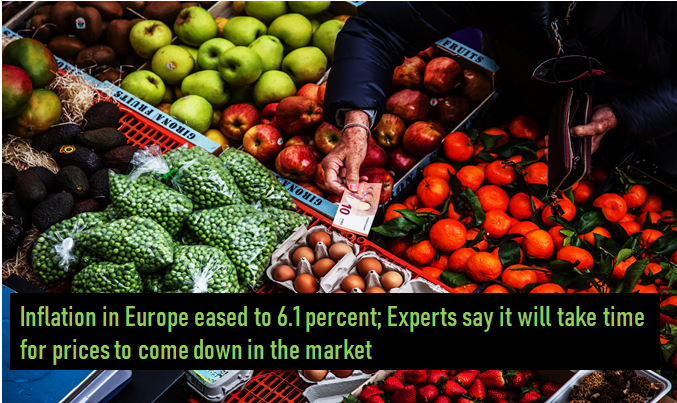Inflation in Europe eased to 6.1 percent; Experts say it will take time for prices to come down in the market
Although inflation in Europe has fallen to 6.1 percent, economists warn that consumers may not see the benefits right away. Market prices for goods, including food, remain high.
In the year to April, headline inflation in the 20 countries in Europe that use the euro as their currency stood at 7%. However, it fell to 6.1% in May. Inflation in Europe’s biggest economies, Germany, France, and Italy, has also slowed to 6.1%, 5.1%, and 7.6%, respectively.
Meanwhile, economists say it may take months for the common man in the market to reap the benefits.
Food prices rose by 13.5% in the year to April 2023. Meanwhile, it has decreased to 12.5% in the month of May.
Inflation in Europe has been slightly relieved by lower energy prices. Energy prices have decreased by 1.7% compared to a year ago. Meanwhile, energy prices increased by 2.4% in a month.
With inflation expected to ease, the European Central Bank is expected to raise interest rates again at its June 15 meeting. While raising interest rates makes it more difficult to obtain loans and other financial products, it also helps to reduce demand for inflationary products, thereby keeping inflation under control.
Russia’s invasion of Ukraine has caused major economic instability in Europe. Fears of a natural gas and oil shortage reaching Europe from Russia have caused market prices to rise. The following setback occurred as the economy was recovering from the COVID epidemic.
European countries were able to control energy prices and inflation to some extent earlier this year by sourcing energy from sources other than Russia. But the European economy grew by only 0.1% in the first quarter of this year.
Irish Samachar English News
Kindly click the link below to join WhatsApp group chat to get important news and breaking news from Irish Samachar.


Comments are closed.